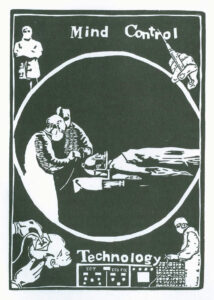A Collage of Voices
If you have been incarcerated and “treated” in a psychiatric institution or ward in any province or territory in Canada and wish to contribute to this important book, please submit your material as quickly as possible.
Don Weitz, 1986
From the beginning, the book was conceived of as a collage of self-expression, voices from the place where the personal met the political. Don had been amassing possible material since the mid-1970s, and now the two editors worked collaboratively, Bonnie taking the lead on editing submissions while Don reached out to survivors across the country, emphasizing the importance of the project and the opportunity for their voices to be heard. Advertisements were placed in publications ranging from mainstream newspapers to movement bulletins. More than 100 individuals responded to the call.
A good working team:
Everyone – except for a lone psychiatrist who submitted – was accepted, though longer pieces were edited down. The result was a powerful mélange of poetry, art and memoir. Although mental health was deeply stigmatized in the 1980s, as it remains today, only two participants chose to use a pseudonym.
A beautiful, powerful collage:
We did say no to one submission:
No “anonymous” here:
We have pulled some specific voices out from the collective volume, speaking from the public stage, from the worlds of art and literature, and to specific injustices that intersected with anti-psychiatry.
In 1964, at the age of 21, DAVID REVILLE had what was then called a nervous-breakdown. He was hospitalized twice in 1965, the second time in Kingston for over two years. After leaving the hospital, Reville became involved in the mad movement and other activism. He sat on Toronto City Council from 1980 to 1985 and was a New Democratic Party Member of Provincial Parliament from 1985 to 1990, after which he was an advisor to Premier Bob Rae, and then chair of the Ontario Advocacy Commission. From 2004 to 2014, Reville taught courses on mad people’s history, history of madness and other subjects in the Ryerson School of Disability Studies. He continues to operate David Reville & Associates, specializing in community development and social research, and much of his work relates to improving mental health and peer support programming.
While in the Kingston psychiatric hospital, David began to chronicle his experience, feeling sure that the public was waiting for such an exposé of conditions in mental hospitals. But he was to find that no one was really interested in what he had to say, which led him to turn first to political activism and later to elected politics, where he found he was most able to effect social change. While initially David was disappointed to find there was little interest in his hospital journal, in 1981, after he was first elected to Toronto City Council, the Kingston Whig-Standard purchased the piece to print. Seven years later, the same piece appeared in Shrink Resistant, and soon after, an excerpt ran in NOW Magazine. Read David’s Shrink Resistant chapter.
A journal I kept in hospital:
David recalled that Don and a few others began a book project called “Voices” in the mid-1970s, getting the word out and placing an ad in MPA’s In A Nutshell, but there was not enough material for a book at that point. By the mid-1980s, however, the voices were there, and as an elected official David was well-positioned to support the initiative. Finding a press willing to take on the book was another piece of good fortune.
We found Lanny Beckman, another little miracle:
Transcription
SUSAN MUSGRAVE is a Governor General Award-nominated poet and author of 19 volumes of poetry, four novels, three non-fiction books and five children’s books. She has also compiled and edited several other books. After being committed to a psychiatric ward at age 14, Musgrave published her first book in 1970, at age 19. In 1986, Susan married convicted bank robber Stephen Reid after reading a manuscript of his book Jackrabbit Parole. Susan has two daughters and spends much of her time at her home on Haida Gwaii.
It spilled out of me,
There was no reason.
As a child I buried everything
I loved, buried it down deep
and seemed pleased.Susan Musgrave
While seeing their work published in Shrink Resistant may have been an exciting moment for many contributors, who look back on it with fond memories, Susan Musgrave barely remembers the book. When Shrink Resistant was published, Musgrave had already published 12 books of poetry and two novels of her own, including the 1980 novel The Charcoal Burners and the 1979 poetry collection A Man to Marry, A Man to Bury, both of which were nominated for Governor General’s Awards.
While institutionalized, Musgrave was encouraged by University of Victoria English professor Robin Skelton to write poems.
You’re not mad, you’re a poet:
Throw a stone at any mental hospital and you’ll hit a poet:
Musgrave’s poetry and the artwork included in Shrink Resistant complement the many essays in the volume, providing imagery and colour in between the personal accounts. The three Musgrave poems in Shrink Resistant are powerful female reflections on madness. Musgrave’s public profile as a known author was recognized by Lanny Beckman as an important way of marketing Shrink Resistant and he contacted her to ask for help in publicizing the volume. Read Musgrave’s Shrink Resistant poems.
LINDA MACDONALD was one of the highest-profile patient victims of Dr. Ewan Cameron’s infamous CIA-funded mind control experiments of the late 1950s and early 1960s. A 26-year-old mother likely suffering from post-partum depression, MacDonald entered Montreal’s Allan Memorial Hospital in 1963, where she was subjected to psychic depatterning, a combination of 102 multi-dose ECT treatments, sleep and drug treatment, and psychological isolation. Returning home, she was unable to recognize her family, recall life before she became a patient, or undertake such simple tasks as cooking an egg or going to the toilet. In 1992, after a long legal battle, MacDonald received $100,000 in compensation from the federal government. Read MacDonald’s Shrink Resistant chapter.
The Allen Memorial:
KATHY (PORTLAND) FRANK was born in 1943 and raised by a working class single mom who took her daughter and ran from an abusive marriage. She spent her teenage years in Vancouver, attending the enriched program at Lord Byng Junior High School. She loved to draw pictures of the ten-metre diving board at University of British Columbia and was one of the few teenage girls of that time with the courage to dive off that board. After several years in nursing training in central Canada, she dropped out and returned to Vancouver with then-partner Kathy LaChaise. Several breakdowns and a break up later, Kathy Frank moved to the MPA (Mental Patients Association) house on East 4th Avenue. Frank was an active MPA member for many years. Always a gifted artist, her drawings and prints were featured in many issues of the MPA’s tabloid, In a Nutshell. Frank’s artwork for MPA is an expression of her belief that a critical position on psychiatry should be matched by a push to find new ways to heal people’s mental pain.

Working with fellow MPA members Frank produced a bibliography of anti-psychiatry publications for MPA in 1974. Then in the late 1970s she worked with the feminist group Press Gang Publishers to produce an expanded version called The Anti-Psychiatry Bibliography and Resource Guide. This was an important resource, notable also for complex, beautiful woodblock prints at every chapter head – four of which appear in Shrink Resistant. Frank attended Vancouver School of Art (now Emily Carr College of Art) where she graduated in 1978, specializing in painting and printmaking. While in art school she met Persimmon Blackbridge with whom she lived for 9 years, leaving the MPA residence, but remaining active and connected to MPA as a whole. She was also involved in the early feminist movement in Vancouver throughout the 1970s, but faced the unconscious classism and sanism that plagued that movement (as it did/does every sector of society). After breaking up with Blackbridge, Frank moved to Quebec City. Bilingual for all of her adult life, she quickly found work as a tour guide in the Old City.
